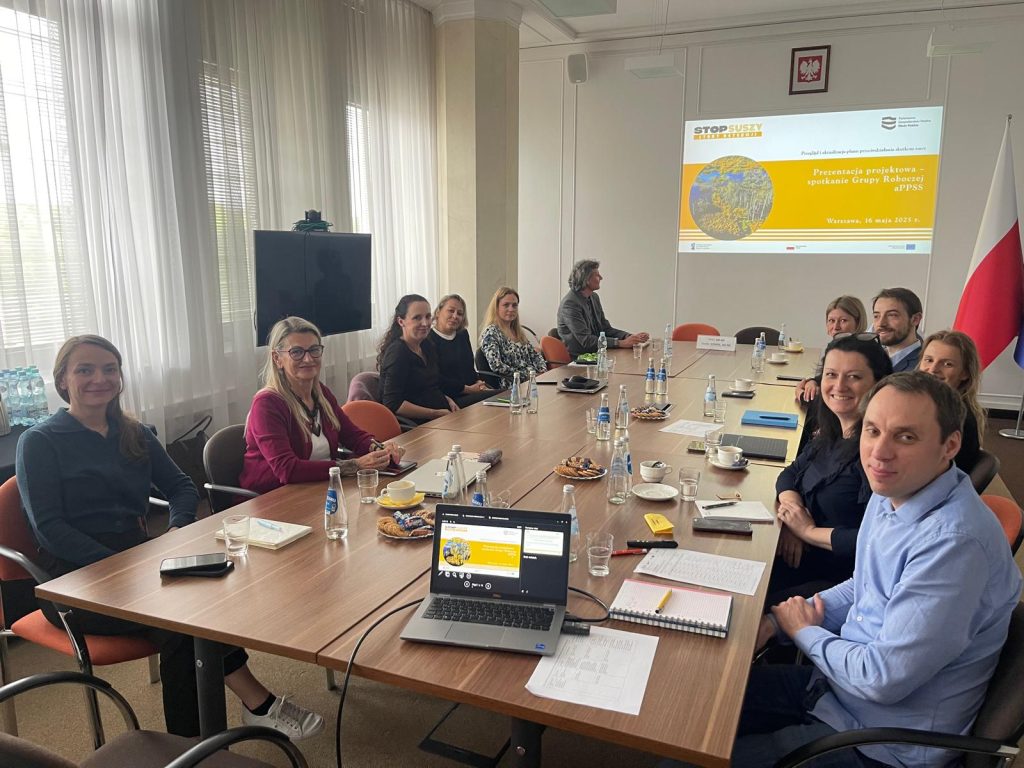When updating the Drought Effects Counteracting Plan (uDECP), broad cooperation of many groups is very important. Experts, representatives of the administration, non-governmental organizations, and practitioners are working on the draft document in working groups. Changes at the legislative level are also necessary to develop the most effective solutions.
The State Water Holding Polish Waters is working on uDECP with the participation of many entities. The planned activities are discussed in an inter-ministerial working group, which includes representatives of the following ministries: Infrastructure, Climate and Environment, Agriculture and Rural Development, and the Agricultural Advisory Centre in Brwinów. The next stages of the creation of uDECP are also constantly supported by a group of experts from various water user environments, who help to develop a catalogue of activities and assess the feasibility of implementing individual solutions. Recently, during the debate, in addition to scientists and practitioners, students also joined in the search for effective solutions – during the “Stop Drought! Start Retention!” conference in Krakow. A survey was sent to other groups affected by the problem of drought in Poland. Representatives of local governments, residents of cities and communes and water users are invited to participate in this largest Polish study. The answers provided by all interested parties will be an important tool in the planned activities.
“Cooperation with various groups in counteracting drought is essential. We also do not forget about inter-ministerial work, thanks to which counteracting the effects of drought will be more effective. This is important because the effects of this phenomenon directly affect the environment and the economy, but indirectly also each of us, regardless of age, profession or views. In this aspect, drought is democratic. We want the work on uDECP to be of such a nature. Thanks to this, a document will be created, the actions of which will be effective in the fight against drought,” says Joanna Kopczyńska, president of Polish Waters.
Necessary changes in the law
Planned activities are key in the work on uDECP. The working group supporting the work on the draft document, in this context, speaks of the need to introduce changes to the law. It is important that the activities related to combating drought in uDECP are divided into the preparation and response phases. “This can only take place at the legislative level. Polish Waters submitted to the Ministry of Infrastructure a proposal for changes to the provisions of the Water Law taking into account such a division of activities. Their aim is to give a more operational character to the Drought Effects Counteracting Plan. Drought counteracting should be described operationally in the Polish crisis management system. DECP should therefore be linked to the crisis management plan,” explains Rafał Jakimiak, uDECP project coordinator at Polish Waters. Among the documents that are closely linked to the National Crisis Management Plan is the internal regulation of the President of Polish Waters No. 24/2024 of 28 June 2024 on crisis management in Polish Waters, which has proven successful in the management structure.
Preparation phase in uDECP
Activities related to the uDECP project are divided into the following phases: preparation and response. At this stage, the list of proposed activities in the preparation phase contains 11 items, and in the response phase – 8. In addition to green and blue infrastructure, they are related to natural retention, promote the use of water in closed circuits, and modernize existing infrastructure. Experts emphasize that the activities should also include those that are aimed at increasing the resilience of aquatic ecosystems dependent on water, including activities related to the reconstruction of ecosystems degraded by the exploitation of water resources. The proposed activities include:
- creation and reconstruction of small retention and microretention facilities in agricultural areas
- construction and reconstruction of the drainage system
- application of agrotechnical treatments increasing soil retention
- implementation of a micro-irrigation system
- creation and reconstruction of forest stands and wetland areas
- renaturation of rivers
Actions in the response phase
Actions should be undertaken in the response phase to limit damage and losses and to take control of the crisis situation as quickly as possible. In such a situation, experts draw attention to, among others:
- conducting ongoing monitoring of the meteorological and hydrological situation in the area of the threat
- analysis of information on the drought threat and coordination of rational control of water flows
- conducting ongoing reporting on the implementation of tasks and the current situation
- conducting water management on flood reservoirs, aimed at reducing the effects of drought
- rational control of water flows, introducing restrictions on the use of water and introducing restrictions on the use of tap water
In the current DECP, responsibility for actions in the response phase applies primarily to Polish Waters. They cannot impose new cooperation frameworks on other institutions, and experts see a need to expand it. They also point out, among other things, the need to develop a response mechanism in the event of drought between individual units. An example is the cooperation in the field of floods between Institute of Meteorology and Water Management, managers of technical infrastructure, and Polish Waters.
Nearly 2 thousand invitations to the survey
Polish Waters also invites residents and representatives of local governments in cities and municipalities exposed to drought today and in the future to cooperate. A large survey on drought is underway until July 10 this year. Almost 2,000 invitations to participate in the survey have been sent out, but any resident of a city, municipality or district can take part in the survey. This formula will allow for the collection of information that will be used to assess the occurrence of drought at the local level, identify remedial actions taken and identify needs in terms of limiting its effects. The survey will be one of the tools in planning effective actions in a specific location and region.
The most important element of work on the uDECP project will be nationwide public consultations. They are planned to begin at the turn of the first and second quarter of 2026. The adoption of the document by way of a regulation of the minister responsible for water management is to take place at the turn of 2027 and 2028.

The project “Review and update of the Drought Effects Counteracting Plan” was co-financed from the European Funds for Infrastructure, Climate, Environment for 2021-2027.

 PL
PL

